The Golden Age of Athens: A Flourishing of Culture, Art, and Philosophy
In the annals of human history, few periods shine as brightly as the Golden Age of Athens. This extraordinary epoch, which flourished from approximately 480 to 404 BCE, marked a pinnacle of cultural, artistic, and philosophical achievement unparalleled in the ancient world. Nestled in the heart of Greece, Athens emerged from the ashes of war to become a beacon of intellect, creativity, and democratic governance.
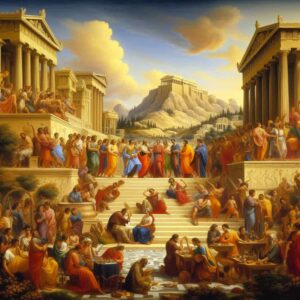
The Cultural Renaissance of Athens: Unveiling the Heart of the Golden Age
In the tapestry of human history, few epochs gleam as brightly as the Golden Age of Athens. From approximately 480 to 404 BCE, Athens experienced a remarkable resurgence—a cultural renaissance that left an indelible mark on civilization. At its core lay a fervent dedication to intellectual inquiry and artistic expression, transforming the city-state into the epicenter of classical civilization.
At the heart of Athens’ Golden Age was a bustling marketplace of ideas—a melting pot where scholars, artists, and thinkers converged from across the Mediterranean. This vibrant exchange of knowledge and creativity ignited the flames of innovation and propelled Athenian society to unparalleled heights.
Under the stewardship of visionary statesmen like Pericles, Athens emerged from the shadows of conflict to embrace a new era of enlightenment. It was a time of rebirth and renewal—a celebration of the human spirit’s capacity for growth and transformation.
Pericles, with his eloquent rhetoric and unwavering vision, guided Athens through tumultuous waters, steering the city-state towards a brighter future. His leadership embodied the democratic ideals that defined Athenian society, fostering an environment where individual freedoms flourished and diversity thrived.
The cultural renaissance of Athens was not merely a product of chance—it was a deliberate cultivation of intellectual curiosity and artistic excellence. Athenians recognized the intrinsic value of knowledge and the transformative power of creativity, laying the groundwork for a golden age of innovation and enlightenment.
In the hallowed halls of Athens, philosophers pondered the mysteries of existence, while artists captured the beauty of the human experience in vibrant hues and delicate brushstrokes. The city’s theaters reverberated with the timeless echoes of tragedy and comedy, captivating audiences with tales of heroism, love, and betrayal.
The Acropolis, with its majestic Parthenon and towering temples, stood as a testament to Athens’ grandeur and ambition—a symbol of the city’s devotion to the gods and its commitment to artistic excellence. Designed by master architects and adorned with intricate sculptures, the Acropolis embodied the ideals of balance, harmony, and order that defined classical Greek aesthetics.
But perhaps the true essence of Athens’ cultural renaissance lay not in its monuments or institutions, but in the spirit of inquiry that permeated every aspect of Athenian life. It was a culture of curiosity—a relentless pursuit of truth, beauty, and meaning that inspired generations to push the boundaries of human knowledge and creativity.
The legacy of Athens’ Golden Age endures to this day—a testament to the enduring power of human imagination and the boundless potential of the human spirit. In an age of uncertainty and upheaval, the story of Athens serves as a beacon of hope—a reminder that even in the darkest of times, the light of enlightenment can still shine bright.
As we gaze upon the ruins of ancient Athens, let us not mourn the passing of a bygone era, but celebrate the enduring legacy of a civilization that dared to dream and aspire to greatness. For in the cultural renaissance of Athens, we find not only the echoes of the past, but the promise of a brighter future—a future shaped by the timeless values of wisdom, creativity, and human flourishing.
The Democratic Ideals of Athens: A Beacon of Participatory Politics
In the annals of history, few political experiments shine as brightly as the democracy of ancient Athens. At the heart of Athenian society lay the revolutionary concept of citizen participation—a bold departure from the autocratic regimes that dominated the ancient world. Unlike its contemporaries, Athens granted its citizens a voice in governance, laying the groundwork for participatory politics that would shape the destiny of the republic.
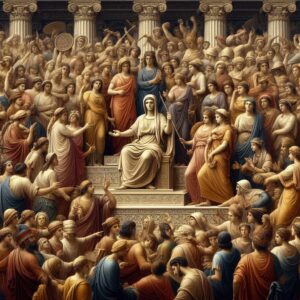
Central to the ethos of Athenian democracy was the belief in the inherent worth and dignity of every citizen. In the bustling streets and squares of Athens, individuals from all walks of life came together to engage in the affairs of the polis. The Agora, the city’s vibrant marketplace, served as the epicenter of civic life—a bustling hub where ideas were exchanged, grievances aired, and decisions made.
Unlike the hierarchical structures of other city-states, where power resided in the hands of a select few, Athens embraced the principle of equality before the law. Every citizen, regardless of wealth or status, possessed the right to participate in the political process—a radical notion that challenged the very foundations of ancient society.
The democratic ideals of Athens found expression in institutions such as the Ecclesia, the citizen assembly responsible for making laws and decisions of state. Here, citizens gathered regularly to debate and vote on matters of public concern, ranging from matters of war and peace to the allocation of public funds. It was a forum where individual voices merged to shape the collective destiny of the republic—a living embodiment of the principle of government by the people, for the people.
Crucial to the functioning of Athenian democracy was the system of ostracism—a mechanism designed to safeguard the integrity of the state by removing individuals deemed a threat to the democratic order. Through a process of open voting, citizens could exile prominent figures whose actions were perceived as detrimental to the welfare of the polis—an early example of the principle of accountability in governance.
But Athenian democracy was not without its flaws and contradictions. While citizens enjoyed unprecedented freedoms within the political sphere, the rights of women, slaves, and non-citizens remained severely restricted—a stark reminder of the limitations of ancient democracy and the prevalence of social inequality.
Despite its imperfections, the legacy of Athenian democracy endures as a beacon of hope and inspiration—a testament to the enduring power of collective action and civic engagement. In an age marked by authoritarianism and political apathy, the story of Athens serves as a powerful reminder of the transformative potential of participatory politics and the enduring relevance of democratic ideals.
As we navigate the complexities of the modern world, let us draw inspiration from the democratic legacy of Athens—a legacy forged in the crucible of debate and dissent, and sustained by the unwavering commitment of its citizens to the principles of justice, equality, and freedom. For in the democratic ideals of Athens, we find not only a blueprint for governance, but a timeless vision of a society founded on the principles of mutual respect, shared responsibility, and the pursuit of the common good.
The Acropolis of Athens: A Testament to Ancient Grandeur and Architectural Mastery
Perched atop the rocky outcrop overlooking the city of Athens, the Acropolis stands as a timeless symbol of human ingenuity and artistic achievement. For centuries, this majestic citadel has captivated the imagination of visitors from around the world, its towering monuments bearing witness to the glory and ambition of ancient Greece.
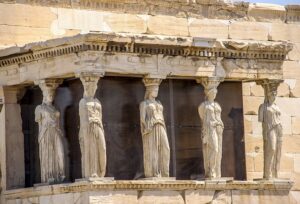
At the heart of the Acropolis lies the Parthenon, a temple dedicated to Athena, the patron goddess of Athens. Crowned by a majestic pediment and adorned with intricate sculptures, the Parthenon is a masterpiece of classical architecture—a testament to the skill and vision of its creators.
Designed by the renowned architects Iktinos and Kallikrates, the Parthenon embodies the ideals of balance, harmony, and order that defined classical Greek aesthetics. Its columns rise with graceful precision, supporting a roof adorned with intricately carved friezes and metopes that depict scenes from Greek mythology and history.
But the Parthenon is more than just a marvel of engineering—it is a testament to the spiritual and cultural values of ancient Athens. For the Athenians, the Acropolis was not just a place of worship, but a symbol of their identity and collective aspirations. It was here, amidst the grandeur of marble and limestone, that they paid homage to their gods and celebrated the achievements of their civilization.
Yet, the Parthenon is just one of many architectural wonders that grace the Acropolis. Surrounding the temple are a host of other sacred structures, including the Erechtheion, with its iconic Caryatid columns, and the Temple of Athena Nike, which stands as a testament to the city’s martial prowess.
But perhaps the most remarkable aspect of the Acropolis is its enduring legacy—a legacy that transcends the boundaries of time and space. Despite centuries of war, conquest, and natural disaster, the Acropolis has remained a symbol of resilience and perseverance, its ancient stones bearing silent witness to the ebb and flow of history.
Today, the Acropolis continues to inspire awe and admiration, drawing millions of visitors each year to its hallowed precincts. For many, it is a pilgrimage—a journey through time and space to the heart of ancient Greece, where gods and mortals once walked side by side.
But beyond its historical significance, the Acropolis serves as a reminder of the enduring power of human creativity and imagination. In an age of uncertainty and upheaval, it stands as a beacon of hope—a testament to the boundless potential of the human spirit to overcome adversity and reach for the stars.
As we gaze upon the majestic ruins of the Acropolis, let us not only marvel at its beauty and magnificence, but also reflect on the values and ideals that it represents. For in the enduring legacy of the Acropolis, we find not only the echoes of the past, but the promise of a brighter future—a future shaped by the timeless principles of beauty, harmony, and human dignity.
The Artistic Renaissance of Athens: Pottery as High Art in the Golden Age
In the annals of human civilization, few periods rival the Golden Age of Athens for its unparalleled artistic splendor. During this remarkable epoch, Athenian artisans unleashed a torrent of creativity that transformed the humble craft of pottery into a form of high art, captivating audiences with its exquisite beauty and narrative depth.

At the heart of Athens’ artistic renaissance lay the art of pottery—a medium that had long been regarded as a utilitarian necessity rather than an object of aesthetic admiration. Yet, during the Golden Age, Athenian potters elevated their craft to new heights, infusing their creations with a level of skill and sophistication that would come to define classical Greek art.
Central to this artistic revolution were masters like Exekias and the anonymous painters of the Berlin Painter, whose works continue to mesmerize and inspire audiences to this day. These virtuoso artisans pushed the boundaries of their craft, transforming simple clay vessels into canvases of breathtaking beauty and complexity.
What set Athenian pottery apart was not just its technical mastery, but its profound engagement with the myths, legends, and ideals that shaped Greek society. Through intricate brushwork and delicate detailing, artists brought to life scenes of gods and heroes, epic battles and tragic love stories, weaving a rich tapestry of myth and history that captivated the imagination of viewers.
One of the most enduring legacies of Athenian pottery is the black-figure and red-figure techniques, which revolutionized the way artists depicted figures and scenes on ceramic vessels. In the black-figure technique, figures and motifs were painted in black silhouette against a reddish-orange background, allowing for greater detail and nuance in storytelling. Conversely, the red-figure technique inverted this process, allowing for greater flexibility and realism in depicting human form and expression.
But perhaps the true genius of Athenian pottery lies not just in its technical prowess, but in its ability to transcend the confines of time and space, speaking to universal themes and emotions that resonate across cultures and generations. Whether depicting the heroism of Achilles or the tragedy of Oedipus, Athenian pottery speaks to the human condition in all its complexity and beauty.
The legacy of Athenian pottery endures as a testament to the enduring power of artistic expression and the transformative potential of human creativity. In an age marked by uncertainty and upheaval, the works of Exekias, the Berlin Painter, and their contemporaries serve as a beacon of inspiration—a reminder of the timeless values of beauty, storytelling, and craftsmanship that continue to enrich our lives and nourish our souls.
As we marvel at the masterpieces of Athenian pottery, let us not only admire their technical brilliance, but also reflect on the profound insights and emotions they evoke. For in the artistic splendor of Athens, we find not just a window into the past, but a mirror to our own humanity—a testament to the enduring power of art to illuminate, inspire, and unite us in our shared journey through life.
Tragedy and Comedy: Exploring the Theatrical Brilliance of Athens’ Golden Age
In the tumultuous landscape of ancient Athens, amidst the shimmering olive groves and bustling agora, the theater emerged as a beacon of cultural enlightenment and artistic expression. The Golden Age of Athens bore witness to an unprecedented flourishing of dramatic talent, as playwrights like Aeschylus, Sophocles, and Euripides crafted timeless masterpieces that continue to captivate audiences with their profound insights into the human condition.
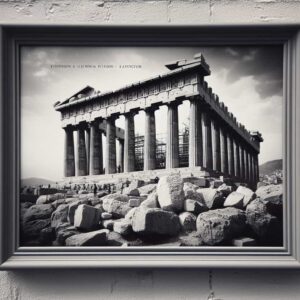
Tragedy and comedy, two pillars of ancient Greek theater, served as mirrors reflecting the complexities of life in all its beauty and brutality. The theater became a sacred space—a sanctuary where audiences could confront the existential questions that haunted their souls and grapple with the moral dilemmas that plagued their society.
At the heart of Athenian tragedy lay the works of Aeschylus, the father of Greek tragedy, whose bold vision and epic scope reshaped the theatrical landscape. From the stirring tragedy of “Prometheus Bound” to the harrowing tale of “The Oresteia,” Aeschylus explored themes of justice, fate, and the divine order with a depth and intensity that left audiences spellbound.
Following in Aeschylus’ footsteps, Sophocles emerged as a towering figure in Athenian theater, his plays probing the depths of the human psyche with unparalleled insight and empathy. In works like “Oedipus Rex” and “Antigone,” Sophocles delved into the darkest recesses of human nature, exposing the frailty of mortal ambition and the inexorable march of fate.
But it was perhaps Euripides, the most innovative and controversial of the three tragedians, who pushed the boundaries of dramatic convention to their limits. In plays like “Medea” and “The Bacchae,” Euripides challenged the audience’s preconceptions and shattered the illusions of heroism and virtue, revealing the raw and unvarnished truth beneath the veneer of civilization.
Yet, amidst the tragedy and despair that permeated Athenian theater, there also flourished a rich tradition of comedy—a celebration of the absurdities and contradictions of human existence. Playwrights like Aristophanes delighted audiences with their sharp wit and biting satire, skewering the foibles of politicians, philosophers, and social elites with gleeful abandon.
From the ribald humor of “Lysistrata” to the biting political commentary of “The Clouds,” Athenian comedy offered audiences a cathartic release—a chance to laugh in the face of adversity and find solace in the absurdity of life.
The legacy of Athenian theater endures as a testament to the enduring power of storytelling and the transformative potential of art. In an age marked by uncertainty and turmoil, the works of Aeschylus, Sophocles, Euripides, and Aristophanes continue to resonate with audiences around the world, their timeless wisdom and unflinching honesty speaking to the universal truths that bind us all.
As we journey through the labyrinth of human experience, let us not forget the lessons of Athenian theater—the enduring importance of empathy, compassion, and the pursuit of truth. For in the tragedy and comedy of life, we find not only the essence of our humanity, but also the promise of redemption and renewal—a testament to the enduring power of the human spirit to transcend even the darkest of shadows and find light in the depths of despair.
Philosophical Brilliance in Athens’ Golden Age: Unraveling the Legacy of Socrates and Plato
In the annals of human thought, few epochs stand as profoundly transformative as Athens’ Golden Age, where philosophical inquiry blossomed into a beacon of enlightenment. At its heart lay a cadre of intellectual luminaries whose ideas continue to reverberate through the corridors of time, reshaping the landscape of human understanding and inspiring generations to seek truth and self-knowledge.
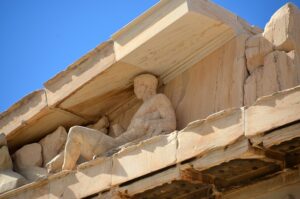
Foremost among these towering intellects was Socrates, the enigmatic gadfly of Athens whose relentless questioning challenged the very foundations of conventional wisdom. Amidst the bustling streets and vibrant agora of the city, Socrates roamed, engaging citizens in philosophical discourse and probing the depths of their beliefs with incisive precision.
For Socrates, the pursuit of truth was not merely an intellectual exercise, but a moral imperative—a journey of self-discovery that demanded courage, humility, and a willingness to confront the limitations of human knowledge. Through his dialectical method, Socrates sought to illuminate the inherent contradictions and inconsistencies that lay at the heart of human understanding, urging his interlocutors to embrace uncertainty and embrace the pursuit of wisdom.
Yet, Socrates’ commitment to intellectual integrity and unwavering dedication to the pursuit of truth ultimately led to his downfall. Condemned to death by the Athenian authorities for allegedly corrupting the youth and impiety, Socrates chose to drink the hemlock rather than compromise his principles—a testament to the indomitable spirit of philosophical inquiry that burned within him.
But Socrates’ legacy did not end with his death. His disciple, Plato, carried forth the torch of philosophical inquiry, founding the Academy—a center of learning that would shape the course of Western thought for centuries to come. Within its hallowed halls, Plato sought to cultivate the minds of future generations, instilling in them a love of wisdom and a commitment to the pursuit of truth.
Central to Plato’s philosophy was the concept of the Forms—an ideal realm of perfect, immutable truths that transcended the flux and imperfection of the material world. Through his dialogues, such as “The Republic” and “The Symposium,” Plato explored the nature of justice, the structure of reality, and the essence of the human soul, inviting readers to embark on a journey of intellectual discovery and self-reflection.
But perhaps Plato’s most enduring contribution to Western thought lies in his portrayal of Socrates as the protagonist of his dialogues—an embodiment of the Socratic method and a testament to the enduring legacy of his mentor’s teachings. Through his writings, Plato immortalized the wisdom and insight of Socrates, ensuring that his voice would echo through the annals of history, inspiring generations to come to embrace the transformative power of philosophical inquiry.
The legacy of Socrates and Plato endures as a testament to the enduring power of human intellect and the transformative potential of philosophical inquiry. In an age marked by uncertainty and upheaval, their teachings serve as a beacon of enlightenment—a reminder of the timeless values of truth, wisdom, and self-knowledge that continue to illuminate the path of human understanding. As we navigate the complexities of the modern world, let us heed the lessons of Athens’ Golden Age, embracing the spirit of inquiry and intellectual curiosity that defined the age of Socrates and Plato, and charting a course towards a future guided by reason, compassion, and the pursuit of truth.
Conclusion
The Golden Age of Athens stands as a testament to the boundless potential of human creativity and intellect. In the span of a few decades, this vibrant city-state forged a legacy that continues to inspire and awe millennia later. From the grandeur of the Parthenon to the wisdom of its philosophers, Athens remains a beacon of enlightenment in the annals of history—a shining example of what humanity can achieve when it dares to dream and aspire to greatness.


